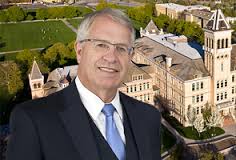President Albrecht Speaks
By: Steven Campbell
Senior writer
At the request of Utah State University students via myVoice, President Stan Albrecht gave an address outlining the state of the university during common hour on Wednesday in the TSC auditorium.
The issues he covered included the successes of the university and the challenges it has been facing.
Albrecht said one of his growing concerns is keeping tuition affordable.
“We need to do everything we can to keep tuition at a level that it doesn’t result in some of you, or some of those who follow you, not being able to come to Utah State University because of tuition costs,” Albrecht said. “And yet balancing that against a reality where the state has continued over a fairly long period of time to decrease its support for public higher education.”
Albrecht said the rising costs of tuition reflects a decrease in support in public higher education. He said the goal is to “hold the line” or keep costs about where they are. One way to do this is to convince the state legislature that public higher education is beneficial for everyone.
“We can’t take the public out of public higher education,” he said.
Albrecht said USU faced some challenges when The Church of Jesus Christ of Latter-Day Saints changed the missionary ages last year.
“The change in LDS missionary policy meant that we would have a downturn in students, which would affect our revenue base,” Albrecht said. “It was really important that we addressed that so that we didn’t have to deal with additional budget cuts, as we had had to deal with during the recession.”
Albrecht said USU was fairly successful at overcoming this. The university was able to get the legislature to allow waivers for out-of-state tuition. He also said the legacy waivers, which grants in-state-tuition to students with parents and grandparents who attended the university, has been successful at addressing this concern.
“We’re a year into this,” he said. “We’ve offset most of the negative impacts of that, and we’ve moved forward in a very positive way.”
Albrecht talked about the need to get the word out about USU.
“I’ll probably get some criticism for the following statement, but I worry about the fact that educational consumers in the state of Utah are not as discerning as I wish they were,” he said.
Parents of potential students have talked to Albrecht about their children deciding between USU and another university. In his opinion, it should not be a difficult decision.
“One of the challenges is really getting that message out so that the discerning consumer can realize the return on investment and the quality of the return on investment at a place like Utah State University,” Albrecht said.
Doug Fiefia, president of the USU student association, said he is working with the university’s public relations and marketing teams to find out how to better involve students. The general plan is to utilize social media to reach potential students.
“We’re looking to do some fun things involving social media campaigns and having students share why they love Utah State,” Fiefia said.
Albrecht left time open to answer questions asked by students. Among them was the concern of whether or not USU athletics would be affected by the lawsuits being taken against the NCAA that could potentially force schools to pay their athletes.
“There’s a great deal of concern, just being really frank with you,” Albrecht said.
Albrecht said one of the biggest issues he discusses with the trustees is addressing the change in the NCAA governments and the lawsuits that are happening. He said the decisions by the courts could have serious implications when it comes to the model of amateurism that intercollegiate athletics has.
Albrecht said because of revenue from media contracts, there is a lot more money available for schools in the Power Five Conferences to pay their athletes than there is for schools in the Mountain West Conference, which includes USU.
“We need to work really hard to maintain the claim that an intercollegiate athletic program stresses amateurism,” Albrecht said. “It stresses opportunity for competition.”
Another student asked why USU is considered one of the safest schools in the nation and how Albrecht seeks to maintain that image.
Albrecht said part of the reason for this is the university is in a community that has historically been safe. He also said the fact that sexual assault is on the rise in many universities is a very big issue that needs to be addressed.
“We’re working very hard to make sure that we are a model program in terms of addressing that issue,” Albrecht said.
Albrecht said sexual assault will always be there, but it is still important to be vigilant to make sure it is minimized.
Another question dealt with concern about available space both in classes and in parking while the university grows and as the LDS missionaries who left with the age change return.
Albrecht said various buildings are being planned that will increase the amount of available classrooms. He also said there are plans to propose a new on-campus housing building, but the private sector has already been helping with the creation of apartment complexes like Blue Square and Aggie Factory.
Albrecht said parking is an issue he plans to address, but he did not give specific details on what the university will do.


I’ve never heard of Steven Campbell. Is he a new writer?